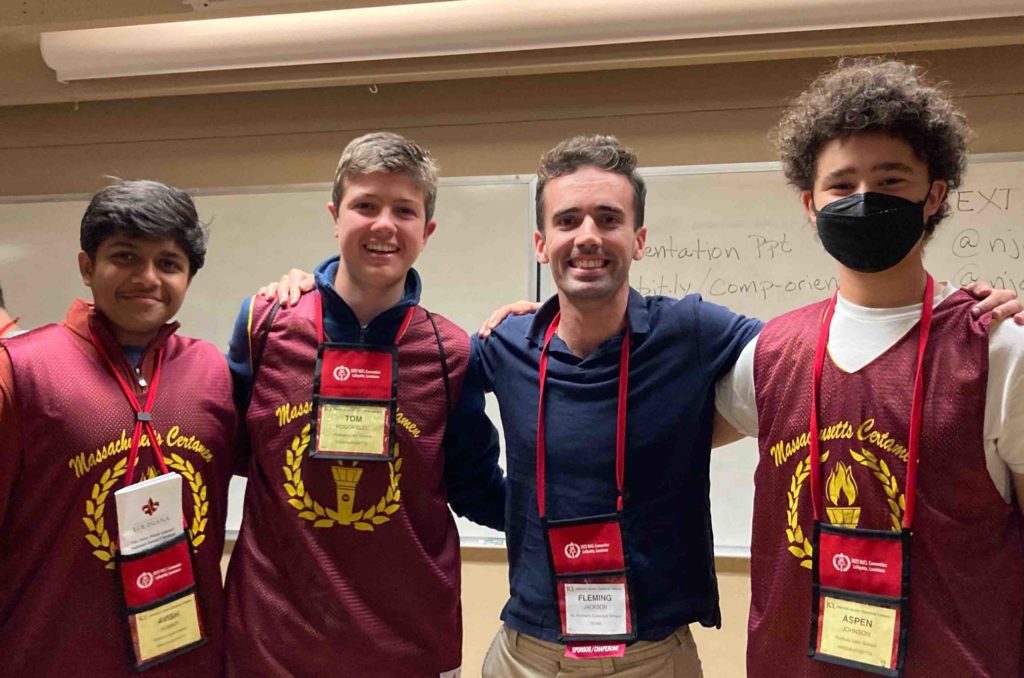Novice Certamen Team Are National Champions!
This summer, three members of Class IV—Aspen Johnson, Avish Kumar, and Tom Pogorelec—participated on the Novice Massachusetts Certamen Team at the 69th Annual National Junior Classical League (NJCL) Convention held at the University of Louisiana, Lafayette, where they won first place in national competition!
Fifteen teams competed for the championship title at the NJCL convention, representing all corners of the country—from Florida to New Hampshire, California to Louisiana, Texas to Illinois. The winning Massachusetts team that competed in the semi-final and final rounds together also included Malvika Dias, a freshman at Boston Latin School. All four students’ names will appear on the first place trophy, which will spend time at both Roxbury Latin and BLS. The final round of competition was an exciting one, requiring two tiebreaker rounds to determine the winner.
The word certamen means “competition” in Latin. According to the NJCL website, “Certamen is a quiz-bowl style game for students of Latin, Greek, and classical civilizations. It allows students to demonstrate their knowledge of the ancient peoples, languages, and cultures, and the relationships between those topics and the modern world. The matches are fun, competitive, informative, and compelling for students.” At this year’s national convention, the three freshmen had the opportunity to meet RL alumnus Jackson Fleming ’11, who was there as a sponsor and chaperone from St. Andrew’s Episcopal School in Texas.
All three members of RL’s Novice Certamen team did not have much experience with Latin prior to arriving at Roxbury Latin in seventh grade. But they each found it to be fun, and interesting, and they learned they had a talent for it.
“I like how it’s kind of a logic puzzle,” says Tom. “Having to make your way through a sentence—using what you know, and filling in the pieces of what you don’t—when you’re translating feels like a game to me. I’m also intrigued by Latin literature.”
Each member of a Certamen team typically has his or her niche, an area of the competition in which they really dig into the topic to prepare, and then take the lead in that category. Those categories include language, history, classical myths, and culture. The competition also includes a section called PMAQ, an abbreviation for phrases, mottos, abbreviations, and quotations.
With essentially 20 questions in a round—20 “tossups”—the team to first buzz in and correctly answer the question wins the point. A team member can hit the buzzer at any point once the question has begun to be read—even before the question is finished. If that individual gets the question wrong, the whole team is eliminated from answering that question. The boys agree that one of the hardest parts of competition, at least early on, is feeling confident enough to buzz, and then knowing exactly when to buzz.
So, how does RL’s team prepare for Certamen? Without the need to practice language—since that language study is built into their Latin classes each week—they rely on quizlets in history, independent reading about myths and culture, attending Classics Club meetings, and practicing with members of RL’s skilled and accomplished Advanced Certamen team, which includes seniors Owen Butler, Will Grossman, James McCurley, and Marc Quintanar.
“One thing that’s interesting about Certamen is that they actually provide you with everything that you need to know in advance,” says Avish. “In most other quiz-style competitions—like in math or science—they don’t provide you with learning materials, like the syllabus you receive for Certamen. Yet, in other kinds of quiz competitions, there’s more of a visual cue. In Certamen, all you can rely on is what you can hear.”
“This is where the challenge of an ancient language really comes into play,” says Aspen. “It’s not even a regular language—which would be hard enough—but the fact that people have different pronunciations makes it even more challenging.”
Tom enthusiastically concludes, “I’m excited for sophomore year, when we’re able to really translate—when Latin becomes almost an English class in which you’re translating—and think in depth about how Roman history would affect their beliefs, how their culture would affect what they’re writing. Being able to learn about, and understand, and encompass all of that—it’s going to be pretty exciting.”
View the official photos from this summer’s NJCL convention.

